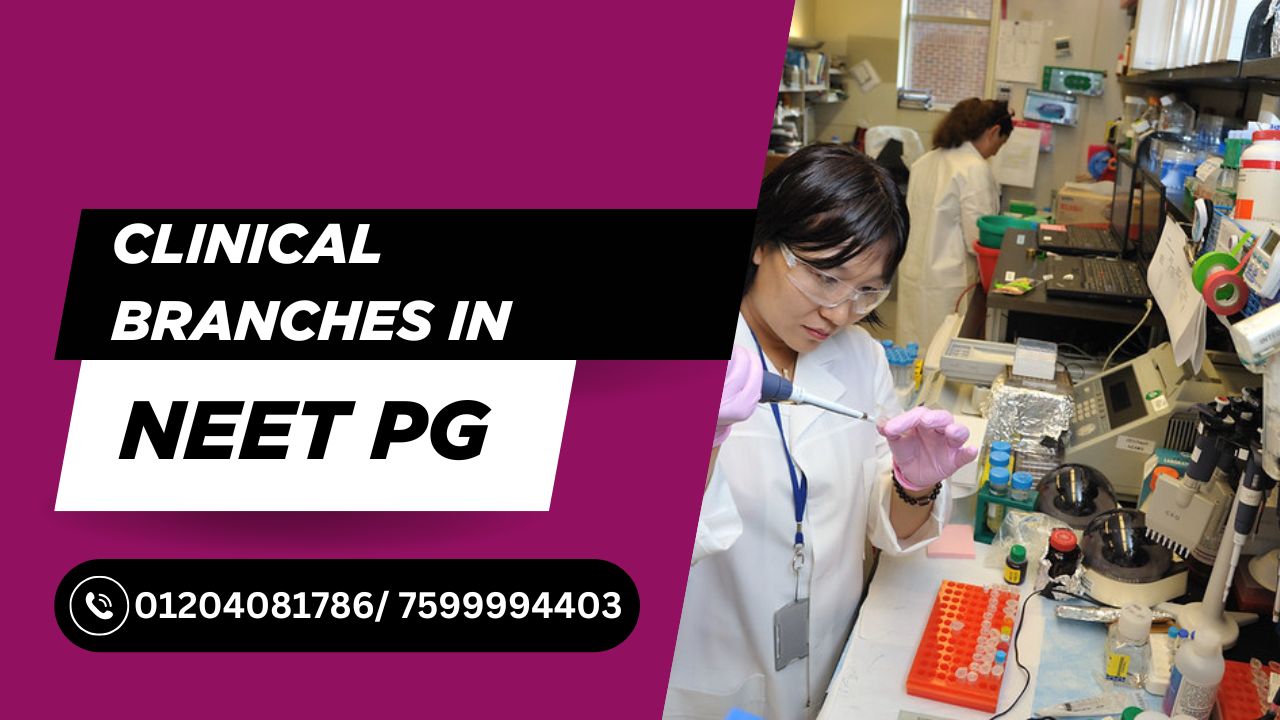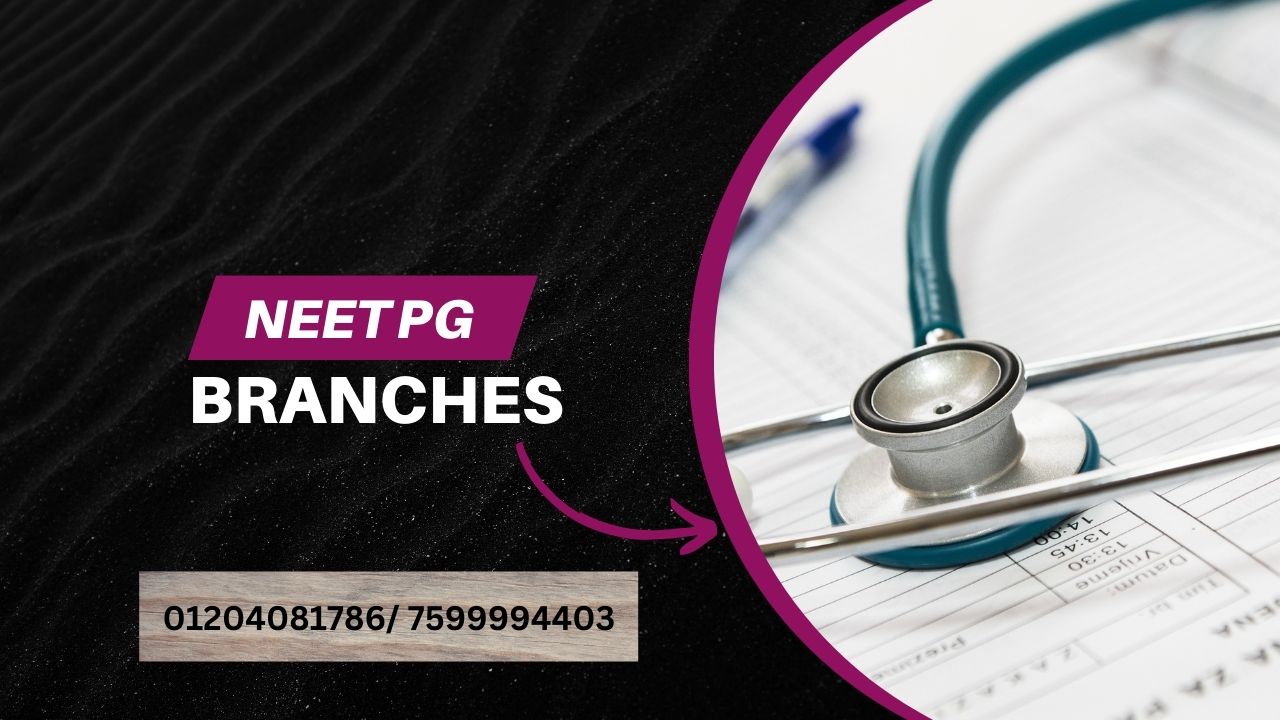
Learn about clinical branches in NEET PG with specializations, their significance, and how to choose the right path at Admission Zone
The NEET PG (Post Graduation) is one of the most important exams for medical graduates who want to pursue higher education in various clinical specialties. The exam has a variety of postgraduate courses, ranging from MD (Doctor of Medicine) and MS (Master of Surgery) to Diploma programs in various specialties. Understanding the clinical branches in NEET PG is essential for candidates who wish to select the specialty that best fits with their interests, career goals, and skills. We will discuss the different clinical branches offered in NEET PG, the detailed scope of each branch, and help you through your decision-making process.

What Are Clinical Branches in NEET PG
Clinical branches in NEET PG refer to those specialties that focus on diagnosing and treating medical conditions through clinical methods, involving direct interaction with patients. These branches are a combination of medical practice and advanced knowledge of diseases, patient care, diagnostic tools, and treatment protocols. These branches cover medical conditions, from infectious diseases and internal medicine to specialized surgical procedures.

Internal Medicine- The Backbone of Clinical Medicine
One of the most specialties in NEET PG is Internal Medicine, which deals with the prevention, diagnosis, and treatment of adult diseases. An MD in Internal Medicine aspirants when becoming doctors then deals with patients of non-surgical illnesses, such as hypertension, diabetes, infections, cardiovascular diseases, and metabolic disorders. It is considered one of the best clinical branches because of its broad scope and the opportunity to work across a variety of settings, from hospitals to private clinics.
- Key Areas: Cardiology, Nephrology, Endocrinology, Pulmonary Medicine, and Infectious diseases.
- Future Prospects: Physicians can further specialize in cardiology, endocrinology, pulmonology, or even pursue academic careers or research.
Pediatrics Caring for Children’s Health
Pediatrics is a clinical branch focused on the medical care of infants, children, and adolescents. An MD in Pediatrics doctors has knowledge and skills to diagnose and treat diseases that are specific to young patients, including growth and development disorders, childhood infections, congenital abnormalities, and vaccination schedules. Pediatrics requires communication skills, as dealing with children and their parents can sometimes be challenging.
- Key Areas: Neonatology, pediatric cardiology, pediatric endocrinology, pediatric gastroenterology.
- Future Prospects: Pediatricians specialize further in subfields such as neonatology, pediatric cardiology, or pursue a career in medical research.
Obstetrics and Gynecology- A Specialty Focused on Women’s Health
Obstetrics and Gynecology is a clinical branch focusing on women’s health, particularly during pregnancy, childbirth, and the postpartum period, along with the diagnosis and treatment of disorders of the female reproductive system. MD in Obstetrics and Gynecology offers the opportunity to work closely with women through all stages of life. OB-GYN specialists provide care during childbirth, perform surgeries like cesarean sections, and manage common conditions such as PCOS (Polycystic Ovary Syndrome), Endometriosis, and Fibroids.
- Key Areas: Maternal-fetal medicine, reproductive endocrinology, infertility treatment, gynecologic oncology.
- Future Prospects: OB-GYNs can specialize in high-risk obstetrics, fertility, gynecologic oncology, or minimally invasive surgery.
Anesthesia- Managing Pain and Patient Comfort
Anesthesia is a specialty in which doctors are trained to safely manage pain during medical procedures. An MD in Anesthesia monitoring the patient’s during surgery, and managing anesthesia for various surgeries, including those in the Cardiac, Neuro, and Orthopedic fields. Anesthesiologists the healthcare system by ensuring patient comfort and safety during surgeries and procedures.
- Key Areas: General Anesthesia, Regional Anesthesia, Pain management, Critical care medicine.
- Future Prospects: Anesthesiologists can further specialize in pain management, neuro-anesthesia, pediatric anesthesia, or intensive care.
Dermatology Skin Care and Aesthetic Medicine
Dermatology is a clinical branch that deals with the diagnosis and treatment of skin disorders, hair problems, and aesthetic concerns. An MD in Dermatology allows doctors to manage conditions like acne, eczema, psoriasis, vitiligo, skin cancer, and more. In recent years, dermatology has also become popular with cosmetic procedures, such as Botox injections, Chemical Peels, and Laser Therapies.
- Key Areas: Clinical Dermatology, Cosmetic Dermatology, Dermatologic surgery, Venereology.
- Future Prospects: Dermatologists can work in Aesthetic medicine, Dermatologic surgery, or even Research in skin-related conditions.
Psychiatry Addressing Mental Health Disorders
Psychiatry is the branch of medicine focused on diagnosing, treating, and preventing mental health disorders, such as depression, anxiety, schizophrenia, and disorder. An MD in Psychiatry allows physicians to explore various therapeutic interventions, including psychotherapy, pharmacotherapy, and electroconvulsive therapy (ECT).
- Key Areas: Child and adolescent psychiatry, geriatric psychiatry, addiction psychiatry, forensic psychiatry.
- Future Prospects: Psychiatrists can specialize in addiction treatment, child psychiatry, or neuropsychiatry.
Radiology – Diagnosing through Imaging
Radiology is a medical field that helps doctors to analyze the reports by using images of the body using special images. Techniques like X-rays, CT scans, and MRIs allow them to find problems such as broken bones, tumors, or infections without surgery.
These images help doctors to make accurate diagnosis decisions and choose the right treatments. Radiology uses advanced tools and machines and by this spot issues early and improves patient care through detailed visuals.
Career Scope: What’s in Demand?
Career scope today is shaped by technology and changing industries. Jobs in fields like IT, healthcare, and renewable energy are in high demand. Skills in coding, data analysis, and digital marketing open many doors. People who adapt quickly and keep learning new things have better chances of success.Also, careers in creative fields like content creation and design are growing fast. Remote work options are increasing, giving more flexibility. Choosing a career that matches your interests and future trends is key to long-term success.
Clinical and Non Clinical Branches in PG
Postgraduate (PG) medical education is divided into clinical and non-clinical branches. Clinical branches focus on direct patient care. Doctors in these fields examine patients, diagnose diseases, and provide treatment. Examples include Medicine, Surgery, Pediatrics, and Obstetrics. These branches require good practical skills and regular interaction with patients in hospitals.
Non-clinical branches mainly focus on academics, research, and laboratory work rather than patient treatment. Doctors work behind the scenes to support healthcare through teaching, diagnostics, and research. Examples include Anatomy, Physiology, Biochemistry, Pharmacology, and Microbiology. These branches are suitable for those interested in teaching, research, and medical science.
Salary: The Financial Perspective
Salary is the money people earn from their jobs, and it plays a big role in their financial life. It helps cover daily needs like food, rent, and bills. A good salary can make life easier by allowing people to save, spend on things they enjoy, and feel secure about the future.From a financial perspective, salary is more than just income—it’s the foundation for planning and managing money. It influences decisions like budgeting, investing, and even taking care of emergencies, making it a key part of financial stability.
How to Choose the Right Medical PG Branch: Passion vs. Scope vs. Salary
Choosing the right medical PG branch is about balancing your passion, future scope, and salary. First, think about what you truly enjoy—doing something you love will keep you motivated through tough times. Next, consider the branch’s growth and demand; a field with good scope provides better job opportunities and career stability. Lastly, look at the salary, but don’t let it be the only factor. A satisfying career comes from a mix of passion, prospects, and fair earnings.
Top Non-Clinical MD/MS Specializations in 2025
- MD in Community Medicine
Focuses on public health, disease prevention, and health education. Ideal for those interested in improving the community. - MD in Hospital Administration
Prepares doctors to manage hospitals and healthcare systems. Great for leadership roles in healthcare. - MD in Health Informatics
Combines healthcare with data and technology. In demand with the rise of digital health and AI. - MD in Forensic Medicine
Involves working with law enforcement, studying causes of death, and legal aspects of medicine. - MD in Anatomy
Focuses on the structure of the human body. A preferred field for those interested in teaching or research. - MD in Physiology
Explores how the human body functions. A good option for academic and research careers. - MD in Biochemistry
Studies chemical processes in the body. In demand in labs, research, and pharmaceutical industries. - MD in Pharmacology
Deals with drug action and safety. Leads to careers in research, pharma companies, and academics.
ENT (Otorhinolaryngology) – Ear, Nose, and Throat Specialization
ENT, or Otorhinolaryngology, is the medical specialty that focuses on problems with the ear, nose, and throat. Doctors in this branch help patients to treat issues like ear infections, hearing loss, sore throats, and sinus troubles.They also manage more serious conditions like tonsil removal, voice problems, and balance disorders. ENT specialists use both medicine and surgery to help patients feel better, hear clearly, and feel more comfortable.
Clinical vs Non-Clinical: What to Choose in 2025
In 2025, choosing between a clinical and non-clinical career depends on your interests and strengths. Clinical roles, like doctors and nurses, involve direct patient care and generally require years of study. They can be rewarding but also demanding.
Non-clinical roles, such as healthcare administration, tech, or research, don’t involve treating patients but still play a vital role in healthcare. If you enjoy organization, data, or problem-solving, this path might suit you better. Both options provide growth and purpose.
Scope and Salary Comparison in Clinical Branches in NEET PG
Clinical branches in NEET PG, like Medicine, Pediatrics, Surgery, and Dermatology, provides good career scope due to high patient demand and opportunities in both government and private hospitals. These branches also allow doctors to start their own practice or work in super-specialty fields later.
When it comes to salary, clinical branches generally provide higher pay compared to non-clinical ones. Fresh postgraduates can earn ₹80,000 to ₹1.5 lakh per month, and with experience, this can go much higher depending on the branch and location.
How to Choose the Right Clinical Branch in NEET PG
Choosing the right clinical branch in NEET PG is a good decision, so start by understanding your interests and strengths. Think about which subjects you want during your MBBS studies and what kind of work you want like surgery, diagnosis, patient interaction, or non clinical roles. Consult with seniors, mentors, or doctors already working in different fields for practical training.
Also, consider your lifestyle, job scope, work-life balance, and future growth in each branch. Don’t just follow trends, choose what feels right for you personally.
Career Scope After Choosing Clinical Branches in NEET PG
Choosing a clinical branch in NEET PG provides many career options to you. You can work in hospitals, start your own clinic, or join government services. Specialties like Medicine, Surgery, Pediatrics, or Obstetrics & Gynecology provide good demand. Future teaching and research centers are also good choices if you are more interested in academics.
With experience, you can also start your super-specialty (DM/MCh) courses for higher studies. Clinical branches also provide you job security, and financial stability.
Challenges Faced in Clinical Branches – What to Expect
Clinical branches in NEET PG are good but come up with challenges like long working hours and night shifts. You’ll generally have to make decisions under pressure, which can be stressful, especially in emergency situations.
Balancing personal life and work is also important at the same time. Some branches demand years of continuous learning and skill. But with passion, patience, and dedication, these challenges become part of a good medical career.
Clinical vs. Non-Clinical Branches
Clinical branches include direct patient care like Medicine, Surgery, or Pediatrics. You’ll be diagnosing, treating, and interacting with patients daily. These branches provide practical training experience, emotional satisfaction, and are in demand, but these demands also come with long working hours and responsibilities.
Non-clinical branches like Pathology, Microbiology, or Pharmacology is based on lab work, research, and teaching. They generally provide good work-life balance and less stress. Both these branches have good futures but it depends on your interests and lifestyle.
General Surgery – A Core Clinical Discipline
General surgery is the main branch of medicine that deals with treating problems inside the body through operations. Surgeons in this field manage issues like appendicitis, hernias, and gallbladder problems.
They also help with emergencies and guide patients about surgery procedures. General surgery is an important branch because it helps them to treat pain, save lives, and improve health when other treatments are not working.
Respiratory Medicine – Treating Lung and Breathing Disorders
Respiratory medicine focuses on diagnosing and treating lung and breathing problems. Doctors in this branch help patients with asthma, bronchitis, pneumonia, and other lung conditions to breathe better and feel more comfortable.
They generally recommend tests, medicines, and sometimes machines like inhalers or oxygen support to improve lung health. Respiratory medicine is important because healthy lungs help the whole body work and keep people active in daily life.
Family Medicine – Comprehensive Care Across All Ages
Family medicine is a branch of medicine that provides care for people of all ages, from babies to adults. Family doctors treat a range of health issues, including common illnesses, minor injuries, and long-term conditions.
They also provide you advice about staying healthy and help with regular check-ups and vaccinations. Family medicine is an important branch because it makes long-term relationships with patients and provides complete, personalized care for the whole family.
Orthopedics Musculoskeletal Care
Orthopedics is the branch of medicine focused on the diagnosis, treatment, and prevention of musculoskeletal disorders, including bone fractures, joint problems, and spine issues. An MS in Orthopedics prepares physicians to perform surgeries such as joint replacements, arthroscopy, and spine surgeries. Orthopedic specialists improve patients’ lives by restoring mobility and function.
Orthopedics is the branch of medicine focused on the diagnosis, treatment, and prevention of musculoskeletal disorders, including bone fractures, joint problems, and spine issues. An MS in Orthopedics prepares physicians to perform surgeries such as joint replacements, arthroscopy, and spine surgeries. Orthopedic specialists improve patients’ lives by restoring mobility and function.
- Key Areas: Trauma care, joint replacement, pediatric orthopedics, spine surgery.
- Future Prospects: Orthopedic surgeons can specialize in spine surgery, sports medicine, or joint replacement.
Emergency Medicine- Immediate Care for Critical Conditions
Emergency Medicine is a clinical specialty focused on the diagnosis and treatment of medical conditions. Physicians trained in Emergency Medicine are skilled in handling trauma, heart attacks, strokes, and other medical emergencies. This specialty requires quick decision-making, critical thinking skills, and the ability to work under pressure.
- Key Areas: Trauma care, cardiology, toxicology, critical care.
- Future Prospects: Emergency medicine doctors can specialize in trauma surgery, toxicology, or prehospital care.
Ophthalmology Vision Care
Ophthalmology is the clinical branch that deals with the diagnosis and treatment of eye disorders. An MS in Ophthalmology allows doctors to perform surgeries such as cataract removal, glaucoma management, and refractive surgeries. Ophthalmologists also manage conditions like diabetic retinopathy, macular degeneration, and other vision-related issues.
- Key Areas: Cataract surgery, retinal diseases, corneal disorders, pediatric ophthalmology.
- Future Prospects: Ophthalmologists can specialize in retina, cornea, glaucoma, or pediatric ophthalmology.

FAQs
Ans: The clinical branches available in NEET PG include Internal Medicine, Pediatrics, Obstetrics and Gynecology, Anesthesia, Dermatology, Psychiatry, Orthopedics, Emergency Medicine, and Ophthalmology.
Ans: Some of the most clinical specialties include Medicine, Pediatrics, Dermatology, Obstetrics and Gynecology.
Ans: After completing NEET PG, candidates can either choose to specialize further by pursuing a DM or MCh, work in hospitals.
Ans: The choice of clinical branch depends on your interests, strengths, and long-term goals. Research each specialty, talk to mentors, and consider the scope.
Ans: Generally, once you select a clinical specialty in NEET PG, it becomes difficult to change.
Connect with Us
Start your medical educational journey with the Admission Zone! Contact us today on 9205488482/ 7599994403 or WhatsApp us to explore a world of educational possibilities in the state and secure your admission to a brighter future.
MD / MS ADMISSION IN INDIA — STATE-WISE
Conclusion
Choosing clinical branches in NEET PG is a decision that fulfills your career goal as a medical professional. Whether it’s Medicine, Pediatrics, Dermatology, or any other specialty, each branch offers its challenges and rewards. It’s important to choose a specialty with your skills, interests, and long-term career goals. Remember that clinical medicine is not only about treating patients but also involves continuous learning, research, and specialization.







